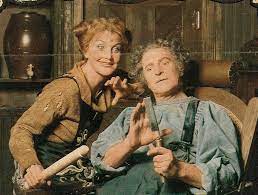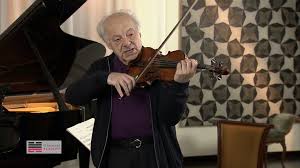London’s West End goes dark for Stephen Sondheim
NewsThe lights in London’s West End will be dimmed on Monday for two minutes at 7pm in honour of the great composer who died on Thursday.
The West End, I once wrote, was quicker to embrace him than Broadway. And he returned the love.
Why was that? Discuss.
The Unsung Sondheim
By Norman Lebrecht / January 8, 2003
Stephen Sondheim is alive and well and living in London. Discard those reference books that describe him as a New Yorker born and bred, mentored by Oscar Hammerstein, the last white hope of the Great White Way. Distrust those critics who hail him as some kind of General Custer of the stage musical, defender of a doomed art against moronic hordes of Lloyd-Webber derivatives.
The truth about Sondheim is that he is a prophet with very little honour in his own land. Most of his musicals bombed on Broadway, before wowing the West End. Several reached the Royal National Theatre, one was sung by English National Opera and most can be seen up and down the land in church halls, college refectories and summer festivals. In English hands, Sondheim is safe – almost failproof.
For America, though, his harmonies are a shade too sophisticated, his wit too introspective, his metaphors too clever by half. Those who go to a musical in expectation of a boy-girl plot and a hummable showstopper feel cheated by Sondheim. He belongs less to the comfort line of Rodgers and Hammerstein than to the laconic self-lacerations of Noel Coward and Frederick Ashton. He writes, somehow, in an English accent. I have never met him, but I’m sure he’d say tom-ahto, not tom-ayto.
Our adoption of Sondheim does not denote superior taste. Many in the West End fail to get the point and even cultists admit that his work has lapses and must be taken whole, or not at all. Their nerve will be tested tonight (Wed) with the return of his greatest flop.
Anyone Can Whistle opened on Broadway on April 4, 1964 and closed after nine performances. Although its theme tune became a popular torchsong, the show has apparently never been staged again. Recast in concert form for a 1994 Aids gala, it was critically hooted as callow juvenilia.
Yet, and it’s a big yet, this was Sondheim’s first attempt at a full-blooded musical. It is seductively scored and rich in the moral complexities that he seditiously introduced to the genre. Its overnight failure remains a theatrical perplexity.
So I rang Arthur Laurents, who wrote the book and directed the original Broadway show. Laurents is a man of extreme candour who calls himself ‘Steve’s best friend’. They first teamed up on West Side Story (music: Bernstein, book: Laurents, lyrics: Sondheim) and went on to co-write Gypsy and Do I Hear a Waltz?. Laurents, 86, has given Anyone Can Whistle a 21st century makeover, cutting it to two acts and furnishing it with laptops and mobile phones.
‘Why did it crash?’ he wonders. ‘Most of the fault was mine. I was both writer and director: I needed someone to tell me you go blind if you do both. Then there was my casting: Angela Lansbury was wonderful, the other two couldn’t sing.’
That judgement is too subjective. On the original cast recording, Lansbury vamps and Harry Guardino emits a toneless growl, but Lee Remick as Nurse Apple renders the title song with a tender twist. ‘She was going out with Steve at the time,’ explains Sondheim’s biographer Meryle Secrest. ‘He was tremendously taken with her.’
Anyone Can Whistle is about a dying town whose decadent mayor invents a water-spouting rock to attract religious tourism. The town’s only other amenity is a mental home, the Coooky Jar. When the cookies mingle with the miracle pilgrims, no-one can tell them apart. The head nurse, its heroine, is an emotional wreck – able to relate only when tarted up in suspenders and speaking French.
‘The piece was ahead of its time,’ says Laurents. ‘It was anti-catholic, anti-capitalist and anti-bogus psychiatrists. It was against almost everything except individuality.’
In the new version, Laurent has excised ‘certain things I found embarrassing’ and fortified the aspect of love. Never a man to spare the hankie, he scored his biggest hit with The Way We Were, a wartime weepie filmed by Barbra Streisand and Robert Redford.
‘Theatre needs emotion,’ he insists. ‘We’re not there to be instructed. I’ve often argued this with Steve. He wanted me to work on Passion (his 1994 musical). I said the title’s a lie – it’s about obsession, not love. He asked me to write a musical he has been working on for the past seven years. It’s called Gold, and it’s about the Myerson brothers, a conman playwright and an architect who built Palm Beach. I didn’t respond to the material. He asks me to do things I haven’t connected with.’
One reason Laurents keeps his line open is, he says, because ‘there has never been a lyricist like Stephen Sondheim.’ It’s the lyrics that make or break a musical. Sondheim, uniquely, writes words to his own music. The songs are all his own and, some say, about himself. ‘Arthur said the song Anyone Can Whistle would be Steve’s epitaph,’ reports Meryle Secrest. ‘It’s about Steve – a person who is out of touch with feelings.’
‘Steve and I have been very close,’ reflects Laurents. ‘It’s hard for him.’ After talk of marriage with Remick (who later wed Kip Gowans and died in 1991), Sondheim stayed single, gay and socially enigmatic.
If all Whistle was about was emotional constipation, it would have deserved to fail. But it contains so many trademark devices that to ignore it risks distorting our understanding of what Sondheim does best.
Where dramatists of the Noel Coward generation adopted boy-girl euphemisms for man-man dilemmas, Sondheim ignored gender difference. What was true between one sex and another could be equally true between one sex and itself. The blur he introduced was into the nature of any sentiment or conviction.
Almost every Sondheim song seems to have a second meaning, or more. In ‘Anyone Can Whistle’, the uptight nurse might be yearning wistfully to learn a childhood skill. Or she could be expressing an inability to experience orgasm, or love itself. The genius of Sondheim resides in suppressing not (as Laurents would have it) human emotion, but the articulation of human emotion. Such reticence is more English in character than American.
He revels, also, in ideological ambiguity. ‘The opposite of left is right,’ chants the Anyone cast,’the opposite of right is wrong; So anyone who’s Left is wrong, right?’ Beat that, Mr Bush.
Sondheim leaves his audience confused and unconsoled. He does not eschew happy endings; instead, he subverts the meaning of happiness so that those who thought they were, are no longer quite so sure. In the murk, the authorial persona becomes immaterial. Sondheim succeeds in burying his own conundra in the cracks of our collective identity.






Sondheim is not unique in writing lyrics for his own music, Cole Porter and Irving Berlin being the most famous who did so. Laurents hit the nail on the head by singling out Sondheim’s lyrics, but even the best lyrics don’t work if the music is underwhelming. I will give it more chances, but have found so much of Sondheim’s actual music just that, underwhelming, to be polite, and believe his best work ultimately was with composers Leonard Bernstein and Jule Styne.
I totally agree with you, however there were some exceptions.
There’s a story (probably apocryphal) about Cole Porter in Italy hearing some music by Rodgers & Hart or Hammerstein. He asked what it was and the answer included the names of the composers. His question, “it takes two people to write a song like that, does it?”
Underwhelming? Each to their own. With Sondheim you can’t separate the words from the music. The line is dramatic, whereas the music is full of moments. If one is looking for the grand tune, that is not Sondheim’s aim. He is in my opinion an actor’s composer rather than say – a singers. The music always serves the text and is paramount – the text is not aimed to fit the music (the music fits the text) which gives its unique structure. In terms of Norman’s question as to why the Brits took to Sondheim quicker than Americans (although I’m not sure I agree), I can only offer that the Brits appreciated eagerly his acrostic word play and wit. There is rarely anything banal in his linguistic structures where semantics, syntax and enjoyment of morphemes and phonemes are ever present. His music is harmonically more complex than most music theater scores which can be read with a simple rhythm chart. Hard to read Sondheim with such. Can the tunes be hummed? Are there too many notes (and words)? How many great composers have been accused of such? Sondheim for me is about moments and his music makes me yearn for more. Surely better than the other way round.
You’ve reinforced the stated point, and Laurent’s implied point. In terms of musical invention he’s not first tier like Kern, Gershwin, Young, and others, including Bernstein. It was telling the way he came to criticize his own lyrics for West Side Story. What he was really saying is that he wished he could write such music.
CBS Sunday Morning (1995)
https://www.youtube.com/watch?v=1zZhTr0Lo2w
Brave Americans will have a chance to see the classic West Side Story film in theaters today and Wednesday. The new version is coming next month, unless…
So glad you illustrated with a clip from the original London production of Sweeney Todd. I went twice to that first run of performances – it only lasted 10 weeks. Both Denis Quilley and Sheila Hancock were amazing in very difficult roles. My friend and I I came out completel overwhelmed and couldn’t understand why the reviews were so cool. I wrote to Quilley at the time that I thought the show was 10 years ahead of its time. He kindly responded to agree – proven when he took on the part again at the National Theatre.
I think dismissing The Way We Were as a “wartime weepie” is a bit blinkered.
Whether you like the film or not, it does tackle important ideas. It starts with the differences in a couple who cannot reconcile the activism of one and the just-let’s-all-get-along passivism of the other. That leads to the ultimate challenge, when the formation of HUAC brings out the difference between those who had the courage to oppose it and the others who complied and “named names” — or just sat on the sidelines, reluctant to make waves, happy just to let the decisions of others ensure their untroubled passage.
And there were yet still others who were appalled that American ‘artists’ were frolicking with totalitarianism (communism) when thousands of American lives had been lost in the fight against tyranny elsewhere. And this all happened from the comfort of middle class armchairs.
Excellent article, NL. It articulates (pun intended) Sondheim’s uniqueness most perceptively.
As for Sondheim’s songs being underwhelming, as per M, of course that’s a matter of taste. For me, it is Sondheim’s command of harmony, more subtle than Bernstein’s or Styne’s, that creates a marvelous post-Impressionist atmosphere. Bernstein:Sondheim :: Puccini:Debussy. And Puccini will always appeal more viscerally to more people — which doesn’t make his music more whelming than Debussy’s.
To begin with, those harmonies (and melodies) are decidedly banal compared to Bill Evans and his peers with rare exceptions, again what Laurents himself implied.
Sondheim and Woody Allen are both more appreciated over here than back in the You Ess. Not hard to see why.
Oh, I don’t know: wouldn’t Sondheim have been a celebrated ‘luvvie’?
In my opinion, vastly overrated.